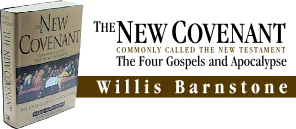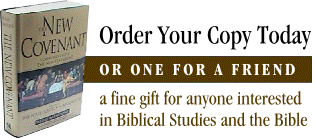|
The Barnstone is the most innovative and refreshing new translation I have seen of the Gospels.
It's difficult to make the case
for something new in biblical studies, but Willis Barnstone's The
New Covenant, Commonly Called the New Testament: The Four Gospels
and the Apocalypse is certainly different. In deciding to provide "a
chastely modern, literary version of a major world text," Barnstone
restores the probable Hebrew and Aramaic names of all of the major characters.
Jesus is Yeshua; his parents Miryam and Yosef take him to Yerushalayim
each year for the Seder of the Pesach. Such determination to restore
the Semitic origins of the New Testament is refreshing, and Barnstone
doubles the fun by following the Gospels not with Acts, as would be
traditional, but with the Apocalypse, the Book of Revelation. Here is
where Barnstone's literary skill shines most clearly, as he renders
the Apocalypse as a great epic poem in loose blank verse. Barnstone's
biblical interpretation is heavily influenced by former Episcopal bishop
John Shelby Spong, but his literary contribution is quite original.
It's a salutary turn of events
when someone comes up with a translation of the New Testament that very
explicitly – not in the footnotes, but in the warp and weft of
the translation itself – emphasizes the historical context. . .
. There are a lot of people around to whom it hasn't occurred that Jesus
was a Jew.
In this ambitious new translation
of Scripture, Barnstone restores to the central figure of the New Testament
his identity both as a poet and as a Jew. The need for this restoration,
prefatory chapters explain, arises out of the reduction of Jesus' words
to mere prose in previous translations and of the introduction, very
early, of anti-Semitism into the biblical texts. Barnstone's achievement
will win plaudits from literary critics and textual scholars: his gifts
as a poet confer a graceful elegance on idiomatic directness, while
his talents as a scholar open up many historical and linguistic questions.
Still, some of the very virtues that will attract scholars will repel
ordinary Bible readers. For in making this translation, Barnstone has
broken sharply with religious traditions that bring typical readers
to the Bible in the first place.
An esteemed translator and poet
and former professor of Greek at Colgate University, Barnstone believes
that in his profession it is crucial to remember Christianity's Jewish
roots. His fresh translation of the four Gospels and the Book of Revelation
relies on Semitic texts, using Aramaic or Hebrew words for personal
and geographical names in place of the more familiar Greek. For example,
Jesus becomes Yeshua, and the Lord, Adonai. Wherever he thinks it justified
by the nature of the text, he also writes in verse. His translation
of the Apocalypse (i.e., the Book of Revelation) is presented in blank
verse because Barnstone considers it the epic poem of the New Covenant
(or the New Testament). While much of this work is similar to modern
translations like the New Revised Standard Version, Barnstone's feel
for poetry lends it a unique elegance and power. Furthermore, he provides
many helpful footnotes that explain his choices. A 100-page introduction
offers insight into the challenges of translation and important background
information on the pre-Hellenic world of Judaism from which the New
Covenant emerged. Although some of his opinions about the historical
Jesus are bound to be challenged, his inclusion of this topic makes
the work even more useful. An important addition to any library's collection
of Bibles and biblical information. |
Praise for
Barnstone's achievement is nothing
less than a gospel for our times. His faith in the reader is well placed
only if the reader remains alert to what this scrupulously argued and
beautifully presented translation makes available.
Nobody who knew Jesus called
him "Jesus." In the beginning, he was Yeshua. The New Covenant,
a translation of the four Gospels and Revelation by the poet and biblical
scholar Willis Barnstone, corrects for that error—and a whole lot
of others, as well. One insight impels this translation. "Although
the gospels have been traditionally accepted as Christian, they deal
with a period before the later followers of Yeshua established a religion
now called Christianity," Barnstone explains. "The gospels
are simply Jewish texts." The New Covenant, though translated from
the Greek, restores the probable Hebrew or Aramaic name not only to
Jesus, but to many other familiar people and places, and it renders
many speeches in poetry as they were originally written.
Barnstone gives no court to the idea that Jesus' ministry was
a debunking of anti-Semitism. He makes the Gospel a plain book about
poor people who find a measure of relief for their suffering, a more
shocking and more hopeful story than the reader knew before.
Barnstone, an eminent translator
of Greek, has an "agenda" for his new New Testament: to confront
the lamentable tradition of Christian anti-Semitism by underscoring
the Jewishness of Jesus' world. Here the Messiah is Yeshua ben Yosef
and his mother is Miryam. But Barnstone does more than recover Hebrew
and Aramaic names. His translation avoids both windiness and "contemporary"
flatness, making a plain, rough music that conveys the amazement of
simple people present at the birth of a new faith.
Willis Barnstone has been appointed
a special angel to bring the 'other' to our attention, to show how it
is done. He illuminates the spirit for us and clarifies the unclarifiable
. . . I think he does it by beating his wings.
Barnstone succeeds extremely
well in making his readers approach the New Testament with fresh eyes,
shifting attention from points of doctrine and historicity, on to what
is common to great religious poetry all over the world: its power to
inspire feelings of hope and joy, and at the same time to convey a sense
of the mystery of human existence.
A
recent interview with Barnstone
About Barnstone's Secret Reader: Four of the best things in America are Walt Whitman's Leaves, Herman
Melville's whale, the sonnets of Barnstone's Secret Reader, and
my daily corn flakes — that rough poetry of morning. |
||
More about poet/translator Willis Barnstone including other translations,
|
|||

